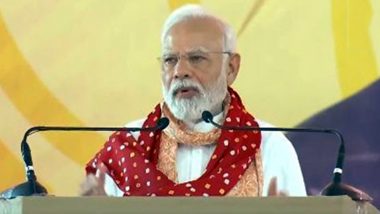Jammu, February 25: Prime Minister Narendra Modi on Sunday virtually laid the foundation stone of 13 critical care projects worth Rs 350.25 crore in Jammu and Kashmir. He also dedicated six ‘Food Safety on Wheels' amounting to Rs 2.63 crore to the people of the Union Territory through virtual mode from Rajkot in Gujarat.
Foundation stone for 100-bedded critical care block units (CCBUs) were laid at Government Medical College (GMC) Jammu and District Hospital Budgam, and 50-bedded CCBUs at district hospitals in Kulgam, Pulwama, Kupwara, Reasi, Poonch and Shopian besides GMC Baramulla, GMC Rajouri, GMC Kathua, SKIMS Bemina (Srinagar) and Public Health Centre Sonamarg. Mann Ki Baat 2024: Social Media Helps Youth in Showcasing Their Skills and Talents, Says PM Narendra Modi.
Approved under PM-ABHIM and ECRP, the critical care units would provide services of emergency, surgical and intensive care to the patients, an official said. Most of the critical care services are confined to tertiary care level with limited access to secondary care and referral transport systems.
The top five causes of mortality - coronary artery disease, chronic obstructive pulmonary disease, stroke, diarrhoeal diseases and neonatal disorders - shall be managed timely at the level of these units itself, the official said, adding it will not only reduce the burden on tertiary care facilities but will also reduce the out of pocket expenses significantly, the official said. PM Modi in Gujarat: Prime Minister Narendra Modi Showered With Flower Petals As He Greets Crowd at Public Event in Rajkot (Watch Video).
The COVID pandemic has highlighted the need for critical care facilities, especially at the level of the districts. To augment the capacity of the district for assured treatment and management of patients with infectious diseases or critical illnesses by creating critical care hospital blocks or wings at district hospitals and medical colleges, according to the official. He said the current architecture of the public hospitals is not equipped fully to handle the dual burden of meeting critical care needs and maintaining essential services as was seen during the two waves of the COVID-19 pandemic.
Many hospital buildings, especially in the districts, do not have provision for segregating a part of the building as an infectious disease treatment blocks, the official said.
(This is an unedited and auto-generated story from Syndicated News feed, LatestLY Staff may not have modified or edited the content body)













 Quickly
Quickly






















